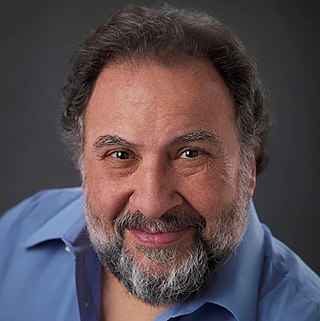Early life, family and education
| | This section needs expansion. You can help by adding to it. (July 2022) |
Bader is a graduate of Harvard College and Harvard Law School. [1]
David M. Bader |
|---|
David M. Bader is an author and former attorney.
| | This section needs expansion. You can help by adding to it. (July 2022) |
Bader is a graduate of Harvard College and Harvard Law School. [1]
Bader was an attorney, and he worked at two law firms, [1] but he eventually focused instead on his career as a writer.
His first book was How to Be an Extremely Reform Jew (Avon Books, 1994). [1] Other works include The Book of Murray: The Life, Teachings, and Kvetching of the Lost Prophet (Harmony Books, 2010), Haiku U.: From Aristotle to Zola: Great Books in 17 Syllables (Gotham Books, 2004), Haikus for Jews: For You a Little Wisdom (Harmony Books, 1999), [2] Zen Judaism: For You a Little Enlightenment (Harmony Books, 2002). [2] He has contributed to the Mirth of a Nation humor anthologies.
Tom Magliozzi read selections from two of Bader's books Haikus for Jews and Zen Judaism on NPR's radio program Car Talk . [3] [4]
Excerpts from Bader's books have been widely circulated on the web and in e-mail, in most cases without permission. As William Novak notes, "his work has been all over the Internet without attribution." [5] [2]
David M. Bader resides and works in New York City.

Abraham Joshua Heschel was a Polish-American rabbi and one of the leading Jewish theologians and Jewish philosophers of the 20th century. Heschel, a professor of Jewish mysticism at the Jewish Theological Seminary of America, authored a number of widely read books on Jewish philosophy and was a leader in the U.S. civil rights movement.

Jacob Neusner was an American academic scholar of Judaism. He was named as one of the most published authors in history, having written or edited more than 900 books.

Jewish philosophy includes all philosophy carried out by Jews, or in relation to the religion of Judaism. Until the modern Haskalah and Jewish emancipation, Jewish philosophy was preoccupied with attempts to reconcile coherent new ideas into the tradition of Rabbinic Judaism, thus organizing emergent ideas that are not necessarily Jewish into a uniquely Jewish scholastic framework and world-view. With their acceptance into modern society, Jews with secular educations embraced or developed entirely new philosophies to meet the demands of the world in which they now found themselves.

The tradition of humor in Judaism dates back to the compilation of the Torah and the Midrash in the ancient Middle East, but the most famous form of Jewish humor consists of the more recent stream of verbal and frequently anecdotal humor of Ashkenazi Jews which took root in the United States during the last one hundred years, it even took root in secular Jewish culture. In its early form, European Jewish humor was developed in the Jewish community of the Holy Roman Empire, with theological satire becoming a traditional way to clandestinely express opposition to Christianization.

Religious Zionism is a religious denomination that views Zionism as a fundamental component of Orthodox Judaism. Its adherents are also referred to as Dati Leumi, and in Israel, they are most commonly known by the plural form of the first part of that term: Datiim. The community is sometimes called 'Knitted kippah', the typical head covering worn by male adherents to Religious Zionism.
Idolatry in Judaism is prohibited. Judaism holds that idolatry is not limited to the worship of an idol itself, but also worship involving any artistic representations of God. The prohibition is epitomized by the first two "words" of the decalogue: I am the Lord thy God, Thou shalt have no other gods before me, and Thou shalt not make unto thee any graven image or any image in the sky, on earth or in the sea. These prohibitions are re-emphasized repeatedly by the later prophets, suggesting the ongoing appeal of Canaanite religion and syncretic assimilation to the ancient Israelites.
Academic study of Jewish mysticism, especially since Gershom Scholem's Major Trends in Jewish Mysticism (1941), draws distinctions between different forms of mysticism which were practiced in different eras of Jewish history. Of these, Kabbalah, which emerged in 12th-century southwestern Europe, is the most well known, but it is not the only typological form, nor was it the first form which emerged. Among the previous forms were Merkabah mysticism, and Ashkenazi Hasidim around the time of the emergence of Kabbalah.
A Jewish Buddhist is a person with an ethnic Jewish background who believes in the tenets of a form of Buddhism.

David Novak, is a Jewish theologian, ethicist, and scholar of Jewish philosophy and law (Halakha). He is an ordained Conservative rabbi and holds the J. Richard and Dorothy Shiff Chair of Jewish Studies as Professor of the Study of Religion and Professor of Philosophy at the University of Toronto since 1997. His areas of interest are Jewish theology, Jewish ethics and biomedical ethics, political theory, and Jewish-Christian relations.
Zen Judaism: For You a Little Enlightenment is a humor book by David M. Bader, the author of Haikus for Jews: For You a Little Wisdom (1999) and Haiku U.: From Aristotle to Zola, Great Books in 17 Syllables.
How to Be an Extremely Reform Jew is a book by David M. Bader, the author of Haikus for Jews: For You a Little Wisdom, Zen Judaism: For You a Little Enlightenment, and Haiku U.: From Aristotle to Zola, Great Books in 17 Syllables. It is the source for some Jewish humor circulated on the Internet, often without attribution, such as "The Feast and Fast Yo-Yo Diet Guide to the Holidays," "The Ten Suggestions" and "The Extremely Reform Passover Haggadah." A reprint edition of the book was published in November, 2014.

Yeshiva Torah Vodaas is a yeshiva in the Flatbush neighborhood of Brooklyn, New York.

Isadore Twersky was an Orthodox rabbi and Hasidic Rebbe, and university professor who held the position as Nathan Littauer Professor of Hebrew Literature and Philosophy at Harvard University, a chair previously held by Harry Austryn Wolfson. Twersky was an internationally recognized authority on Rabbinic literature and Jewish philosophy. He was especially known as an international expert in the writings and influence of the 12th-century Jewish legalist and philosopher Maimonides, and Abraham ben David, the Rabad of Posquieres.

Jacob Immanuel Schochet was a Swiss-born Canadian rabbi who wrote on Hasidic Judaism. He was a member of the Chabad movement.

Joel Chasnoff is an American-Israeli stand-up comedian and writer with stage and screen credits in eight countries, and author of the comic memoir The 188th Crybaby Brigade, about his year as a tank soldier in the Israeli Army.

Moshe Waldoks is an American rabbi who co-edited The Big Book of Jewish Humor.
William Novak is a Canadian–American author who has co-written or ghostwritten numerous celebrity memoirs for people including Lee Iacocca, Nancy Reagan, and Magic Johnson. He is also the editor, with Moshe Waldoks, of The Big Book of Jewish Humor. He has also written several "private" books, which he described in a 2015 essay for The New York Times.
Since the 20th century, Buddhism and Judaism have become associated due to the common religious overlap in Jewish Buddhists. According to the Ten Commandments and classical Jewish law (halacha), it is forbidden for Jews to worship any deity other than the God of Israel—specifically by bowing or offering incense, sacrifices, or poured libations. It is likewise forbidden to join or serve in another religion as doing so would render the participating Jew an apostate or idol worshipper.

David Biale was an American historian specializing in Jewish history.